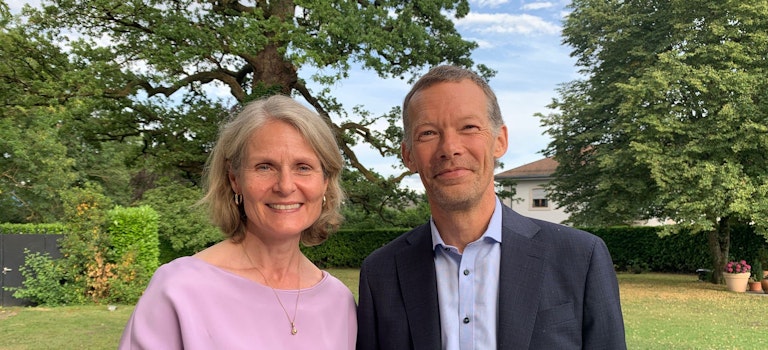Over the last years, promoting Work-Life Balance in partner organisations has been part of the Nordic Ambassadors’ joint International Gender Champions commitments in Geneva and New York. At the Geneva Champions meeting in January, Tine Mørch Smith, Norwegian Ambassador, and Erik Brøgger Rasmussen, Danish Ambassador, took the floor to talk about gender equality and challenges with Work-Life Balance in Geneva-based organisations. As the two ambassadors are preparing to leave Geneva this summer, we talked to them to hear their experiences.
- In your capacity as International Gender Champions you have been vocal advocates for Work-Life Balance. Which linkages do you see between gender equality and Work-Life Balance?
Brøgger Rasmussen: Work-Life Balance should not be seen as a luxury. It is a vital part of making progress in gender equality and I believe it also creates a healthier organisation and better results. Gender-equality-oriented family policies, which enable families to make their own choices, are important tools to promote Work-Life Balance. Over the last decades, both our countries have institutionalised a range of family- and parent-friendly services and benefits, which have contributed to more flexibility and opportunities to combine careers and family-life in all its diversity.
Mørch Smith: This includes publicly subsidised kindergartens and after-school care, in addition to paid parental leave for both mothers and fathers with a quota for each parent, paid breaks to breastfeed for nursing mothers and paid leave for parents if the child is ill. A strong focus on family planning services and sexual and reproductive health and rights has been at the centre of this development. Today, the results of these policies- in addition to others, such as a universal child-benefit scheme for children under the age of 18 and tax benefits for families- are high levels of female employment and representation of women in higher education and the labour market. 2021 figures showed that 84% of all Norwegian mothers with children under 17 were working.
- From your personal experience in International Geneva, what are the main obstacles that get in the way of a healthy Work-Life Balance?
Mørch Smith: Geneva is a place where a lot of the informal information exchange, both at our level and at expert level, takes place in the evening at dinners and receptions. This means that you are missing out on useful relationship building and information exchange if you prioritise your family and children in the evenings instead.
Brøgger Rasmussen: The framework conditions for creating a healthy Work-Life Balance in Geneva are challenging at all levels. The day-to-day work is often determined by external agendas – be it negotiations, meetings, a new crisis to respond to or more informal networking settings. All very important parts of your job, so the task is to prioritize your engagement. Otherwise, the work becomes endless. In this setting, you cannot avoid peak periods and long working hours. The key task therefore is to make sure to prioritize so that the peak periods do not become the absolute normal. And insist to take time off when Geneva is closing down – we empty the office completely during such periods.
- How can entities promote Work-Life Balance among their employees and which role can Senior Leaders play in that? How have you personally gone about promoting Work-Life Balance in your Mission?
Brøgger Rasmussen: Talking about Work-Life Balance can be a sensitive issue, and senior leadership therefore has an important role in proactively recognizing this as an issue. Internally, I have made it a personal KPI to create a better Work-Life Balance at the Mission, which is measured each year through the Ministry of Foreign Affairs staff survey. This priority has been communicated clearly to all staff at the Mission, and we have had several internal discussions on how we can make improvements. Work-Life Balance does not look the same for all employees, some prefer staying in the office getting their work done, while others prioritize to leave earlier to spend time with their kids, and then do some of their work in the evening. My experience is that as a manager you have to both be clear on your priorities and have an ongoing dialogue to support your staff in prioritizing in a way that creates the balance they need.
Externally, I have taken the same proactive approach towards partners, asking about staff welfare – especially in situations where the partner organisation is undergoing challenging times. It is important that we, as donors and/or members of different organisations, signal that this is a matter we care about and wish to see addressed.
Mørch Smith: Allowing flexible working hours that enable employees to take time off for a personal event like a parent-teacher conference or a veterinarian visit during the day, and catch up on work in the evening instead, is one approach. It is also important to be conscious about who you may lose if you organise evening events. Can perhaps a lunch meeting achieve the same, but ensure more diverse participation? As a manager I take interest in my colleagues’ lives outside of work, to better understand their needs and constraints and seeing colleagues as the parents, grandparents, pet owners, football lovers etc. they are outside of working hours. We all contribute differently at different stages in our lives. This diversity in perspectives and experiences adds value to the work that we do. I have also asked colleagues who organise and participate in annual consultations with Geneva-based partner organisations to ask these questions to partners. Sometimes, the answer we get is only that “there is no Work-Life Balance in Geneva”. But this doesn’t make it less important to continue to ask the questions. We need to keep engaging in these conversations to move the needle towards a healthy Work-Life Balance for all.
